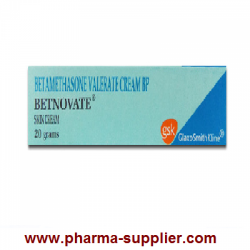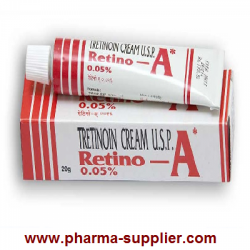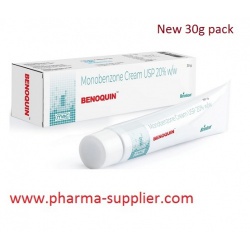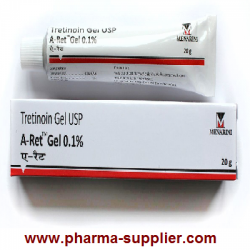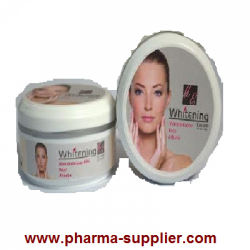Skin Care
What is Betnovate (Betamethasone Valerate 20g Cream)?
Betnovate (Betamethasone Valerate 20g Cream) is a trade name of the active ingredient Betamethasone. It is an active synthetic corticosteroid (analog of the hormone of adrenal cortex) of the local action, giving a fast effect in cases of the inflammatory dermatosis (skin diseases). This drug provides an anti-inflammatory local, anti-allergic, antiedematous and antiproliferative action. It has the stronger vasoconstrictive action than other glucocorticosteroids. It provides the stronger the narrowing of the blood vessels and reduces the blood circulation, and this stimulates less the development of the allergic reactions.
Betnovate cream is a rather safe drug by means of the local use. It is rather poor absorbed through the skin, so that it does not cause systemic effects.
Affecting the skin there is a prevention of the acentric accumulation of neutrophils, and it leads to the reduction of exudation, production of cytokines, inhibition of mugration of macrophages, leading to the reduction of the allergic and inflammatory processes.
How does Betnovate work?
Betnovate products contain the active ingredient betamethasone, which is a type of medicine called a topical corticosteroid. Betamethasone cream and ointment are also available without a brand name, ie as the generic medicine.
Corticosteroids (also known as steroids) are medicines used for reducing inflammation. Skin inflammation may occur as a result of an allergic reaction, or irritation of the skin. It is caused by the immune system releasing substances that make blood vessels in the skin widen. This makes the irritated area become red, swollen, itchy and painful, as is seen in dermatitis or eczema.
When betamethasone is applied to the skin it acts inside cells to decrease the release of these inflammatory substances. This reduces swelling, redness and itching.
There is a range of potencies of corticosteroids available for application to the skin. Betnovate cream, ointment and lotion contain betamethasone valerate 0.1% and are classed as potent corticosteroids. They are prescribed to treat various inflammatory skin disorders that have not responded to milder steroids.
Betnovate cream is more suitable for moist, weeping areas of skin, while the thicker, more greasy ointment is more suitable for dry, scaly areas of skin. Betnovate lotion spreads easily and is more suitable for hairy areas of skin, or when minimal application to a large area of skin is needed.
Betnovate Common Use
- Betnovate Cream is applied externally to the affected parts of the skin and carefully rubbed.
- The cream should be used 2-3 times a day depending on the form of the disease, level of the severity, and reaction of the body to the treatment
- Do not apply much cream because it is not almost absorbed, and so the patient spends the part of the cream
- After the application it is better to use the maintaining dosage and apply the drug once per day, before going to bed.
- If necessary the occlusive dressings are used which are replaced every 24 hours (the dampening chamber causing loosening of the horny layer and faster penetration of the drug is created because of the evaporation of sweat and skin breathing)
- In order to avoid the relapses of the disease it is necessary to use the cream for several days after the complete disappearance of the symptoms. This way it is possible to achieve the results.
Side effects of Betnovate
Medicines and their possible side effects can affect individual people in different ways. The following are some of the side effects that are known to be associated with this medicine. Just because a side effect is stated here, it does not mean that all people using this medicine will experience that or any side effect.
- Skin irritation, eg redness, rash, itching or burning on application, or allergic inflammation of the skin (contact dermatitis). Stop using this medicine and consult your doctor if you think you have experienced a reaction or your skin condition appears to be getting worse.
- Spread or worsening of untreated infections.
- Thinning of the skin.
- Reduced skin pigmentation.
- Stretch marks (striae).
- Groupings of fine blood vessels becoming prominent under the skin (telangiectasia).
- Excessive hair growth (hypertrichosis).
- Prolonged use of this medicine on extensive areas of skin, broken or raw skin, skin folds or underneath airtight dressings may on very rare occasions result in enough corticosteroid being absorbed to have side effects on other parts of the body, for example a decrease in the production of natural hormones by the adrenal glands, or symptoms of Cushing's syndrome - see warning section above.
Betnovate (Betamethasone Valerate 20g Cream) side effects listed above may not include all of the side effects reported by the medicine's manufacturer. For more information about any other possible risks associated with this medicine, please read the information provided with the medicine or consult your doctor or pharmacist.
If you think you have experienced a side effect from a medicine or vaccine you should check the patient information leaflet. This lists the known side effects and what to do if you get them. You can also get advice from your doctor, nurse or pharmacist. If they think it's necessary they'll report it for you.
What is Betnovate-S Cream Used For
Betnovate-S (Betamethasone 0.1% w/w + Salicylic Acid IP 3.0 % w/w) helps to reduce the redness, itching, and swelling of skin conditions such as eczema, psoriasis, contact dermatitis, and seborrhea. Betnovate-S helps to reduce the redness, itching, and swelling of skin conditions such as eczema, psoriasis, contact dermatitis and seborrhea.
Betnovate S Cream Uses and Benefits
Betnovate S Cream is used in the treatment, control, prevention, & improvement of the following diseases, conditions and symptoms:
- Skin problems
- Eczema
- Allergic disorders
- Skin conditions
- Ulcerative colitis
- Arthritis
- Lupus
- Psoriasis
- Bronchial asthma
- Atopic dermatitis
- Scalp psoriasis
- Hands psoriasis
- Feet psoriasis
- Skin diseases
- Acne
- Blemishes
- Skin redness
- Dandruff
- Calluses and corns
Betnovate S Cream Interactions
Medicine and salt interactions may increase or decrease the activity of Betnovate S Cream when taken together with certain other medicines. Betnovate S Cream may interact with the following medicines and salts:
- Amphotericin b
- Carbamazepine
- Fluocinolone
- Hydroquinone
- Isotretinoin
- Lofexidine
Side Effects of Betnovate-S Cream
If the following side effects occur after use of Betnovate S Ointment you should report to your prescriber or health care professional as soon as possible:
- burning or itching of the skin
- dark red spots on the skin
- infection
- lack of healing of the skin condition
- painful, red, pus-filled blisters in hair follicles
- severe burning and continued itching of the skin
- thinning of the skin, with easy bruising, sunburn more likely especially on the face
Other serious side effects can develop if you use Betnovate-S Ointment for a long time, or if you use too much. Contact your prescriber or health care professional if you notice any unusual effects.
Side effects that usually do not require medical attention (report to your prescriber or health care professional if they continue or are bothersome):
- burning, itching, or irritation of the skin
- dry skin
- increased redness or scaling of the skin
Betnovate-N (Betamethasone Valerate and Neomycin 20mg Cream) is one of a group of medicines called topical steroids. "Topical" means they are put on the skin. Topical steroids reduce the redness and itchiness of certain skin problems. (They should not be confused with "anabolic" steroids misused by some body builders and taken as tablets or injections). Betnovate-N (Betamethasone Valerate and Neomycin 20mg Cream) also contains neomycin which may help to prevent or clear up some bacterial infections of the skin.
What is in your cream
Betnovate-N Cream is one of a group of medicines called topical steroids. "Topical" means they are put on the skin. Topical steroids reduce the redness and itchiness of certain skin problems. (They should not be confused with "anabolic" steroids misused by some body builders and taken as tablets or injections).
Betnovate-N Cream also contains neomycin which may help to prevent or clear up some bacterial infections of the skin.
Ingredients of the cream include:
- The main active ingredient - betamethasone (as valerate) 0.1%
- an antibacterial agent - neomycin sulphate 3%
- a preservative - chlorocresol
- in a base containing cetomacrogol 1000, white soft paraffin, and liquid paraffin.
The cream does not contain any lanolin, parabens or colouring agents.
Betnovate-N Cream Side Effects ?
- Most people find using this cream causes no problems when used in the right amount for the correct length of time (See above as well as guidance on back of this leaflet).
- IF you find your condition gets worse during treatment you may be allergic to the cream or have a skin infection which needs other treatment.
- Stop using the cream and tell your doctor as soon as possible
- Repeated courses of topical steroids over a long period of time may sometimes cause changes in hair growth and skin colour.
How Much Cream To Use
If your doctor has told you in detail how to use the cream then keep to that advice otherwise:-
Two or three times a day, after washing your hands, gently rub the correct amount of cream into the skin until it has all disappeared.
For an adult:
You should find that
- two fingertips of cream will treat both hands or one foot
- three fingertips of cream will treat one arm
- six fingertips of cream will treat one leg
- fourteen fingertips of cream will treat the front and back of one trunk
What is Benoquin cream ?
Benoquin cream is used for depigmentation of the skin as a treatment for widespread vitiligo, a skin condition in which white patches of skin appear on different parts of the body. This happens because the melanocytes cells that make pigment in the skin are destroyed. Benoquin cream is used as a skin lighter in people with vitiligo to reduce the color of patches of skin that contain pigment so that they match the areas of skin that have lost the color. The cream contains monobenzone an active ingredient, which destroy remaining melanocytes and as the amount of melanin decreases the areas of the normal skin gradually matches up with the affected skin of vitiligo.
The Benoquin cream is not meant to treat other skin conditions such as age spots, freckles, and sun spots, skin discoloration caused by hormone medicine, perfumes, pregnancy or skin trauma. Benoquin causes permanent discoloration of the skin and hence, it may not be the right treatment to treat other skin conditions.
How to use Benoquin topical
This Benoquin cream medication is for use on the skin only. Apply a thin layer of the Benoquin cream to normal-colored skin, usually 2-3 times daily or as directed by your doctor. Avoid getting this product in your eyes or on the inside of your nose or mouth. If you do get this Benoquin cream in those areas, flush with plenty of water. After using this Benoquin cream, the skin will be permanently affected and sensitive to sunlight. Avoid prolonged exposure to sunlight, tanning booths, and sunlamps. Always use a sunscreen of SPF 15 or greater, and wear protective clothing when outdoors.
It may take up to 4 months before the full benefit of this drug takes effect. Once the desired skin color is achieved, this medication is applied only as needed to maintain your new skin color (usually 2 times a week).Use this medication regularly to get the most benefit from it. To help you remember, use it at the same times each day. Inform your doctor if your condition persists or worsens after 4 months.
When should Benoquin Cream not be used?
You should not use Benoquin Cream if you:
- are allergic to monobenzone or any ingredients in Benoquin Cream
- are wanting mild cosmetic bleaching of he skin as this whitening is irreversible
- are pregnant or are breastfeeding
Dosage of Benoquin cream
Benoquin contains monobenzone which helps to lighten the skin in people with vitiligo. The dosage of Benoquin cream will be determined by your skin specialist based on the severity of skin condition, age, and medical history. Usually, it is applied 2 to 3 times daily for up to 4 months; however, it is still mandatory to consult your doctor before using it. You should apply a thin layer of the cream to normal patches of the skin. Do not increase or lessen the frequency of Benoquin cream without consulting with your doctor that may affect the effectiveness of the cream.
Side Effects Benoquin cream
Mild burning, irritation, redness, cracking, or peeling of the treated skin may occur. If any of these effects persist or worsen, tell your doctor or pharmacist promptly.
Skin that is not treated with this medication may also become discolored or irregular in appearance. Sometimes these effects may be permanent. Ask your doctor or pharmacist for more details.
Remember that your doctor has prescribed this medication because he or she has judged that the benefit to you is greater than the risk of side effects. Many people using this medication do not have serious side effects.
A very serious allergic reaction to this drug is rare. However, seek immediate medical attention if you notice any symptoms of a serious allergic reaction, including: rash, itching/swelling (especially of the face/tongue/throat), severe dizziness, trouble breathing.
This is not a complete list of possible side effects. If you notice other effects not listed above, contact your doctor or pharmacist.
Warnings of Benoquin Cream
- Understand that Benoquin cream is meant to treat vitiligo and not recommended to use any other skin conditions. Hence, apply it as directed by your doctor and do not apply on any chapped or cracked skin.
- The Benoquin cream requires medical guidance and hence, makes sure that your dosage is administered only by a medical professional.
- Some people may be allergic to Benoquin cream(monobenzone) or any ingredients contained in Benoquin cream and hence, they should not use. Also, if youre taking any other treatment, you should tell your doctor for proper guidance.
- Keep this Benoquin cream away from children and pregnant or breastfeeding women.
- Benoquin cream acts like a skin lighter but is not recommended for cosmetic purpose, skin bleaching or treating any other skin conditions. The cream is for a medicinal purpose and hence, do not purchase this ointment just because your friends or relatives have referred. Using this medication without proper consultation may cause unwanted side effects.
What is A Ret Gel (Tretinoin 1% Gel)?
A Ret Gel (Tretinoin 1% Gel) is a gel form of Tretinoin containing 0.1% per tube. The gel works by unblocking pores to facilitate natural functioning of oil glands. The result is lesser acne and blackheads. The gel works to alleviate acne but not cure it entirely. The medicine also has other functions. Patients are known to use the gel for minimizing wrinkles and improving overall skin appearance.
How is A Ret Gel (Tretinoin 1% Gel) used?
A Ret Gel (Tretinoin 1% Gel) is usually applied topically once per day unless otherwise directed by a doctor. Contact a doctor for the correct dosage and length of treatment as it will depend on the patients condition and their response to the therapy. Prior to applying the gel, wash your hands and affected area with mild soap and allow to air dry for 20 to 30 minutes. Apply a small dose with the fingertips to the affected area and massage it in gently to cover the entire affected area. Your acne may become worst in the beginning of your treatment as it is working on pimples forming inside the skin. The medication may take up to 8 to 12 weeks to notice the results from the treatment.
Uses Benoquin Cream (Monobenzone)
Benoquin Cream (Monobenzone) is a topical depigmenting medication, used primarily in the treatment of Vitiligo which is characterized by white patches on the skin due to loss of melanocytes. It works by decreasing the amount of melanin and bring about uniform colouring of the patient`s skin. This cream is not effective in treating hyper-pigmentation resulting from other pigments.
Side Effects Benoquin Cream (Monobenzone)
Common side effects of Benoquin Cream (Monobenzone) which should be reported to your physician include itchiness, redness, and mild irritation. If any persist or worry you, inform your physician promptly.
What is Monobenzone Cream 40%?
Monobenzone Cream 40% cream is a patented combination formulation which rapidly begins the onset of depigmentation. Micronized crystal of Monobenzone Cream 40% are absorbed quickly while Retinoic acid helps in exfoliation as well as penetration in the skin. The combination formulation is intended for Arms & Legs depigmentation including stubborn spots.
Monobenzone Cream 40% Acid Cream is intended for those who wants to get rid of stubborn pigmentation and repigmentation.
The cream is made using the latest cream formula that incorporates fresh batch of micronized monobenzone powder. Unlike many brown version of oxidized Monobenzone Cream 40%, this creams contains antioxidants which helps in maintaining its off-white cream color.
What Are The Advantages Over Normal Monobenzone Cream 40% ?
- Micronization of Monobenzone Cream 40% powder will result in high penetration of the active ingredient.
- This combination formulation conatins Retinoic Acid which exfoliates upper layers of the skin making the path way for Monobenzone Cream 40% to penetrate in deeper layers.
We are Supplier and exporters of Monobenzone 20% ,40% and 60% Cream or you can say Anti-vtiligo cream. Our skin cream is manufactured under set industrial norms and quality control
Monobenzone is the our largest selling product in the world
BUY Monobenzone Cream 40% WITH CONFIDENCE
Monobenzone , Benoquin , Depigmentation , Vitiligo , Fair , Bleach , Cream , Skin Care
We supply Monobenzone creams. Paste 20%, 40% and 60%. Monobenzone, applied topically to the skin, is used as a depigmenting. Monobenzone works by permanently removing color from normal skin located around skin with vitiligo.
Indications: For final depigmentation in extensive vitiligo
Direction: Apply and rub into the pigmented area 2 or 3 times daily by physician. Prolonged exposure to sunlight should be avoided during treatment with Monobenzone cream.
Storage: Proper stpred at room temperature, cool and dry place, KEEP OUT OF CHILDREN.
Monobenzone Cream 40% Side effects
Common side effects of Monobenzone 40% Cream which should be reported to your physician include itchiness, redness, and mild irritation. If any persist or worry you, inform your physician promptly.
Precautions
Monobenzone increases skin`s sensitivity to UV rays. Avoid exposure to direct sunlight and do not use any form of UV sun lamps while using the cream, and for some time after. When exposure to direct sunlight is unavoidable, protect skin with thick clothing as much as possible and use high factor sunscreen.
Do not use Monobenzone Cream 40% for any cosmetic uses. It is only recommended for use treating vitiligo when prescribed by a physician.
- 1
